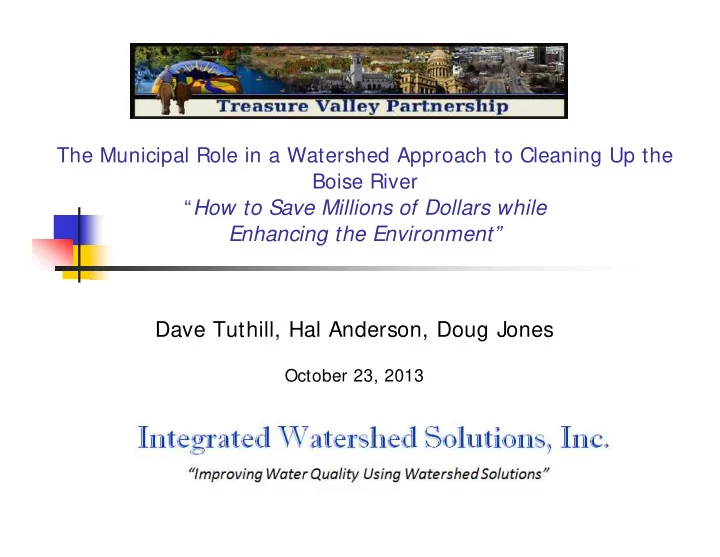

The Municipal Role in a Watershed Approach to Cleaning Up the Boise River “ How to Save Millions of Dollars while Enhancing the Environment” Dave Tuthill, Hal Anderson, Doug Jones October 23, 2013
Boise River Today Municipalities can have a major role in cleaning up the Boise River – while saving money Upper reaches are beautiful Lower reaches need help Photo by Ken Miracle Aug 29, 2012
Topics Brief background on IWS What is the solution? Next Steps Next Steps
501c(3) Non-profit Corporation Founded in February, 2012 Originally named Idaho Watershed Solutions, Originally named Idaho Watershed Solutions, Inc. – renamed in early 2013 Presently funded for a sediment pond/wetland demonstration project on North Alkali Drain west of Parma Modeled after The Freshwater Trust, but with additional emphasis on irrigated agriculture
Willamette Partnership Work with EPA and DEQs to establish trading policies In the Northwest and beyond The Integrated Freshwater Watershed Trust Solutions, Inc.
Integrated Watershed Solutions, Inc. Technical Team Mr. Hal Anderson – Water Mr. Phil Rassier – Water Law Resource Planning and Rules. Dr. Mark Ankeny – Soil Dr. Mark Ankeny – Soil Dr. Rob Tiedemann – Dr. Rob Tiedemann – Science Science Wetlands and Ecology Wetlands and Ecology Mr. Doug Jones – Precision Mr. Jeff Reeder – Water Agriculture Resource Engineering Mr. Mark Masarik – EPA Mr. Michael Schulz – Water Programs Resouce Engineering Mr. Bob Haynes – Northern Mr. Steve Pollack – Idaho Government Relations Mr. Ernie Carlsen – Eastern Dr. Dave Tuthill – Water Idaho Administration
Problem Nutrients, sediments and temperature are impacting rivers and streams In many basins nonpoint sources are In many basins nonpoint sources are major contributors A watershed approach is attractive, but it is difficult to achieve
Opportunities for a Watershed Approach Automation of Automation of Reuse of Ag Reuse of Ag Irrigation Delivery and Systems Municipal Water Precision Riparian Agriculture Activities
Automation Objective: Take only what you need – leave the rest in the River and Reservoirs
Reuse Objective: Use nutrient laden water for Irrigation before it returns to the river Twin Falls Canal Company – Photo by Brian Olmstead, Manager
Precision Agriculture Objective: Apply the correct amounts and types of nutrients in the right places
Riparian Activities Objective: Create wetlands to remove sediment, nutrients and lower temperatures Photo by Dr. Rob Tiedemann
Capital Cost vs Effluent Phosphorus 10 Million Gallon per Day Waste Water Treatment Plant 5 4.5 $480,000 $480,000 to to $7,000 $7,000 4 $720,000/ lb $720,000/ lb-day day to to horus (MG/ L) removed removed $30,000/ lb $30,000/ lb-day day 3.5 removed removed 3 Effluent Phospho 2.5 2 $2,080,000 $2,080,000 Slide prepared by to to Larry Bennett, 1.5 $2,600,000/ lb- $2,600,000/ lb -day day Bennett Engineering removed removed 1 0.5 0 0 5 10 15 20 25 30 35 40 45 50 55 60 65 70 75 80 85 90 95 100 105 110 Capital Cost ($M)
1 2 3
Next Steps 1. Seek EPA support for providing trading credit for non-point source solutions credit for non-point source solutions 2. Include non-point source solutions in matrices of wastewater alternatives 3. Support a “Swimmable Boise River in 2018 Campaign”
Thank You
Recommend
More recommend